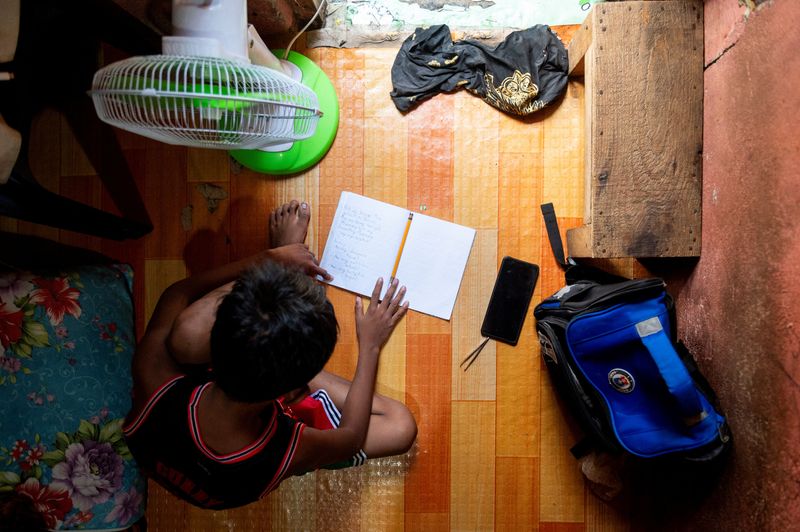Written by Neil Jerome Morales
MANILA (Reuters) – The Philippines closed schools and warned of an overloaded power grid, as authorities across Southeast Asia issued a series of health alerts over a devastating and deadly heatwave.
The Philippine Department of Education on Sunday suspended in-person classes in public schools for two days.
“Over the past few days, there have already been reports of high blood pressure, dizziness and fainting in students and teachers,” Benjo Basas, president of the teachers' group Union for Dignity, told radio station DWPM.
Temperatures in the Philippines are expected to reach 37 degrees Celsius (98.6 degrees Fahrenheit) over the next three days, leaving many classrooms crowded and without air conditioning.
The country's weather agency said the heat index (the actual temperature felt by the body, including relative humidity) was expected to remain at a record 45 degrees Celsius (113 degrees Fahrenheit), marking conditions as “dangerous” as possible. He said that it is within the range of classification. Prolonged exposure can cause heat stroke.
The heatwave is also putting pressure on power supplies on the main island of Luzon, which accounts for three-quarters of economic output, with reserves dwindling after 13 power plants shut down earlier this month, the Philippine power grid said. the operator said in a statement. .
In Thailand, temperatures are expected to exceed 40 degrees Celsius in Bangkok and central and northern Thailand, with the Japan Meteorological Agency advising people to avoid spending long periods outdoors.
Temperatures in the northern city of Lampang soared to 44.2 degrees Celsius on April 22, and the weather bureau said on Monday that the intense heat is expected to continue this week.
According to data from Thailand's Ministry of Health, 30 people have died from heatstroke in the past month.
Dehydration symptoms, heat shock
People seek refuge from the heat in air-conditioned shopping malls in Vietnam's business capital Ho Chi Minh City, state media reported, as the country's meteorological agency warned of the dangers of forest fires, dehydration and heat shock. .
The agency said on Sunday that the highest temperatures measured in several regions in northern and central Vietnam ranged from 40.2 degrees Celsius to 44.0 degrees Celsius, adding that temperatures were not expected to drop until Wednesday.
Vietnam's state-run electricity company also warned that electricity consumption had reached a record high in recent days and urged consumers to refrain from overusing air conditioners.
The Malaysian Meteorological Department on Sunday issued a heatwave warning for 16 areas that recorded temperatures of 35 to 40 degrees Celsius (95 to 104 degrees Fahrenheit) for three consecutive days.
The Ministry of Health announced that as of April 13, a total of 45 cases of heat-related illness had been reported in the country, but did not say when it had started tracing the cases. The ministry said in a statement that two deaths due to heatstroke have been reported.
In neighboring city-state Singapore, the Bureau of Meteorology said temperatures in 2024 could be warmer than last year, making it the fourth warmest year since records began in 1929.
Singapore's hottest day on record was May 13 last year, when the daily maximum temperature reached 37 degrees Celsius.
Some schools have relaxed their uniform regulations since last month to allow students to wear more comfortable gym clothes as the heat continues.
Meanwhile, in Indonesia, the most populous country in Southeast Asia, the number of people infected with dengue fever, a mosquito-borne disease, is rapidly increasing due to rising temperatures, increasing from 15,000 the previous year to 30,000. The Ministry of Health announced that the number of people has more than doubled to 5,000.
Siti Nadia Tarmizi, spokesperson for Indonesia's Ministry of Health, told state news agency Antara that El Niño weather patterns are prolonging the dry season and rising temperatures are accelerating the mosquito life cycle.
(Reporting by Neil Jerome Morales in Manila; Panarat Thepgoumpanat in Bangkok; Khanh Bu in Hanoi; Hung Hoi Kok in Singapore; Danial Azhar in Malaysia; Kate Lam in Jakarta; Editing by John Mair and Raju・Gopalakrishnan)


